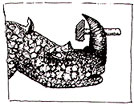 |
|||
 |
|||
|
|
|
|
|
|
|
Introduction to the Surrealist Issue of RACE TRAITOR |
|||
This special issue of Race Traitor focuses on a particular group of race traitors—the world's first Surrealist Group in 1920s Paris, and its direct offshoot, the international (and multiracial) surrealist movement. With an unbroken continuity from 1924 down to the present day, the surrealist movement has helped develop not only a revolutionary critique of whiteness but also new forms of revolutionary action against it. As a historically constructed social formation, the notion of a "white race" appears as ideology, mirage, hoax, con-game, racket, swindle: an altogether malevolent piece of duplicity and horror. But for those who buy it and sell it, whiteness is what Richard Wright once called a powerful "psychological reality," a commodity fetishized into a pattern of belief, custom, law'n'order. Millions of those who are deceived into thinking they are white are unhappy about it, but don't quite know how to divest themselves of this debilitating delusion. How to quit being white—how to release the latent but repressed yearning to abandon the absurdity of whiteness and to become truly human at last—is one of the burning questions of the age. |
|||
|
Surrealist intervention in this domain has always emphasized the active imagination, in keeping with |
|
||
|
surrealism's fundamental aim: the realization of poetry in everyday life. Of course it also involves revolutionary criticism, integral subversion, aggressive humor, and direct action. In poetry as in life, surrealism embodies the utmost fraternization and solidarity across the color-line as well as relentless struggle against the very existence of the color-line, and against all those who enforce it or tolerate it. As we emphasized in our declaration on the Los Angeles Rebellion of April-May 1992,* whiteness corrupts and derails every impulse toward freedom, so that no solution can be found to any social problem without solving the problem of whiteness. Everyone knows that white supremacy is the single biggest obstacle to working class emancipation. It is also the major stumbling-block in the way of women's equality, for white supremacy is inherently androcentric. There are of course female white supremacists—a large part of today's "women's movement" is afflicted with this malady—but such women truly are no more than cheerleaders of the white male power structure. Can anyone doubt that overcoming whiteness is indispensable to women's liberation? Similarly, it is no accident that the people most responsible for devastating the Earth's wild places, poisoning the air and water, driving uncountable species of animals and plants to extinction and otherwise wrecking the planet, are those who think of themselves as white. Only when humankind is free of the stifling burden of whiteness will we be able to develop a non-exploitative, ecologically sound relationship to the Earth and all its inhabitants. With rare exceptions, however, the organizations that currently pass themselves off as the "environmental movement" in this country are as devoted to white supremacy (and to capitalism) as the giant corporations whose depredations they pretend to oppose. As surrealists, we are especially interested in how the "white problem" turns up in language, images, myth, symbols, popular culture, everyday life, the whole field of human expression. However, our goal at all times is to attack and abolish whiteness and its institutions—to attack and abolish the whole social/political/economic/cultural system that has made whiteness the hideous emblem of the worst oppression the world has ever had to endure. With this presentation of the concrete experience of surrealists past and present in the worldwide struggle against white supremacy, we hope above all to provoke and inspire readers to develop their own abolitionist imaginations in new directions, and more generally to stimulate discussion and debate with all who uphold the motto "Treason to Whiteness is Loyalty to Humanity." |
|||
|
|
|||
|
Chicago, April 1998
* The Chicago Surrealist Group, "Three Days That Shook the New World
Order: The Los Angeles Rebellion of 1992," Race Traitor No.
2 (Winter 1993), 1-17. |
|||










